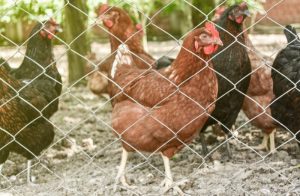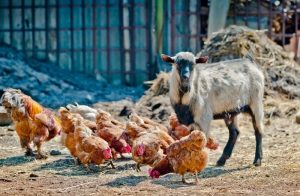What You Need to Know About Goats Protecting Chickens
As useful as it is to own chickens, they seem to have a way of getting snatched by predators. Chickens have many enemies, from dogs and coyotes to raccoons and foxes, and even owls and hawks. If you plan on owning chickens, you should consider getting a livestock guardian animal to provide protection for the poultry. There are many different types of livestock guardian animals that do well at protecting chickens.
So, do goats protect chickens? Goats are not known to protect chickens; in fact, goats usually fall prey to the same predators that chickens do. While goats won’t fight off predators, their size may deter birds of prey from hunting your chickens.
While goats and chickens may not be able to protect each other, there are some benefits to having the two species co-exist. Figuring out how to protect your chickens from danger can be difficult; keep reading to learn more!
What Animals are Predators to Chickens?
To properly protect your chickens from predators, it’s good to know which animals view your chickens as a tasty snack. Here is a list of the predators your chickens may face:
- Dogs
- Coyotes
- Foxes
- Raccoons
- Bobcats
- Weasels
- Opossums
- Skunks
- Cats
- Hawks
- Eagles
- Owls
- Snakes
One of the best things you can do to keep your chickens protected is by securing them in a coop for the night. Nighttime is when your chickens are most susceptible to danger, as many of these animals are nocturnal and tend to hunt once night falls.
It’s important to try and identify the predator that may be attacking your chickens, as this will let you know what type of protective barriers you need to install.
How to Protect Your Chickens From Predators
By taking the proper precautions, you can provide better protection for your chickens. Here is a list of things to consider when it comes to preventing predators from reaching your chickens:
Goats Will Not Protect Your Chickens From Predators
To better answer your overall question of whether goats will protect chickens, goats will do very little to protect your chickens. Goats themselves are prey animals and will flee from anything they deem a potential threat. While donkeys, mules, and even llamas may try to fight off a predator, goats will run away, forgetting all about your chickens.
To tops things off, predators that like to eat chickens usually like to eat goats too. By adding goats to your chicken brood, you can actually entice predators to attack more frequently.
Goats Will Deter Birds of Prey From Snatching Your Chickens
While goats won’t deter predators on the ground, they can deter birds of prey from swooping down and snatching your chickens. Owls, hawks, and eagles will avoid hunting in areas of commotion or where there are larger animals. Goats are just the right size and cause just enough chaos to keep the birds of prey at bay. If your chickens will intermingle with the goats, they may have a shot of avoiding an attack from above.
Bury the Fencing Around the Chicken Enclosure
 One way you can add an extra level of protection for your chickens is by burying the fencing around their enclosure into the ground. This can block predators from digging under the fence and getting into the chicken enclosure. By burying chicken wire at least 12 inches into the ground, you can deter just about any predator from digging into your chicken enclosure.
One way you can add an extra level of protection for your chickens is by burying the fencing around their enclosure into the ground. This can block predators from digging under the fence and getting into the chicken enclosure. By burying chicken wire at least 12 inches into the ground, you can deter just about any predator from digging into your chicken enclosure.
The type of fencing you use can go a long way in protecting your chickens. The best type of fencing to use is welded metal chicken wire. the metal provides a strong barrier while the chicken mesh will keep predators from coming through the fence. You can even consider putting electric fencing around the outside of the chicken enclosure to prevent predators from getting closer.
Add a Roof to Your Chicken Enclosure
To protect your chickens from birds of prey or any other predator that may be willing to climb a fence into your chicken pen, you can add a roof to your chicken enclosure. You can put chicken wire over the enclosure or a tarp or solid roof. Installing a solid roof can protect your chickens from weather and your enclosure from getting wet and muddy. Either way, adding some type of covering or roofing to your chicken enclosure can work to protect your chickens from predators.
If you plan on adding a mesh covering over your chicken enclosure, be sure that it is stabilized enough to hold the weight of a predator. I’ve seen cats sitting ontop of mesh coverings as they watch the chickens below! The last thing I would want is for the covering to fail and the predator to get into the enclosure.
Make Sure Your Chicken Coop Doesn’t Have Access Points for Predators
A chicken coop is supposed to be a place of security and protection for your chickens, so it can be traumatic when a predator manages to find a way in. Check your chicken coop for any access points that may enable predators to slip in. Check to see how secure the doors are into the coop; are all entryways closed securely at night?
You can secure your chicken coop by repairing any damage and by covering the outside of your coop with tarps that can prevent predators from finding a way in. You’d be surprised at the small spaces that snakes and skunks can fit into. Cover windows with chicken wire and add strong latches to all the doors.
Invest in a Livestock Guardian Animal
While goats may not be any good at protecting your chickens, there are other types of livestock and animals that will provide protection to your poultry. If your chickens are free-range, it can be easy to add them to a group of livestock that can protect them. If you plan on keeping your chickens in an enclosure, it may be more difficult. Here is a list of some of the best animal guardians for chickens:
- Dogs
- Geese
- Donkeys
- Llamas
Many people train their dogs to protect their chickens. Dogs are social creatures and will bond with the animals they are around; however, if not trained early enough, your dog may want to chase your chickens more than it wants to protect them. Donkeys and llamas, on the other hand, aren’t known to go after chickens. While they are prey animals, both donkeys and llamas will fight off predators that interrupt their peace.
Everyone has at one point or another run into a mean goose at the park. Geese will also protect chickens by hissing at and chasing anything they deem a threat. Since they’re another type of poultry, it can be easy to integrate them into your flock of chickens.
To learn more about the different livestock guardian animals, check out our article What Are the Best Livestock Guardian Animals?
Create Visibility Around Your Chicken Enclosure
Predators tend to favor hunting in areas where they can sneak up on their prey and pounce. If the area around your chicken enclosure is overgrown, it can provide great hiding places for predators to wait before striking. One way you can deter predators is by keeping the area around your chicken enclosure kept. Cut grasses short and remove any fixtures that may provide a shadow to hide in for predators.
Avoid keeping your chickens near wooded areas, as many predators rely on the woods for coverage as they hunt. Instead, try placing your chicken coop and enclosure in a more open area.
Can Goats and Chickens Be Kept Together?
Goats and chickens do get along and can go out in the same area together. They can even have a symbiotic relationship where they both benefit from being around the other. Chickens love to peck through goat poop and will eat any worm or parasite they may find. This can keep your goat herd from getting worms.
Before you keep your goats and chickens together, you should know that goat will eat ANYTHING, including chicken feed. If you don’t provide chicken feed in the chicken coop, the goats may eat all of it before the chickens can get any.
When you keep your chickens out with other animals, it’s important to continue to provide them with a chicken coop where they can escape to. They will still need to be shut in their coop at night, so they can rest and stay safe from predators.
I hope this article was helpful to you in learning whether goats will protect your chickens. We have many articles discussing the care of both livestock and poultry. Check out a few of our articles down below:

